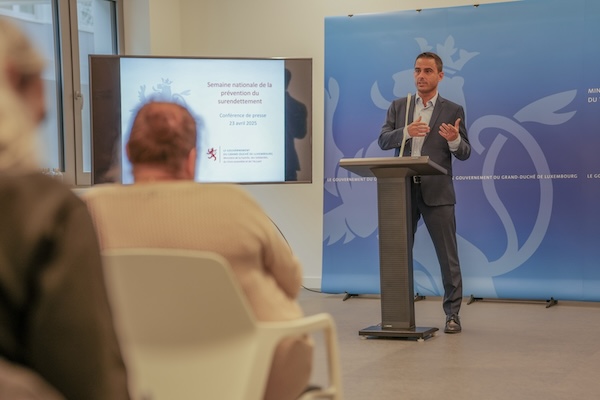 Max Hahn, Luxembourg’s Minister for Family Affairs, Solidarity, Living Together and Reception of Refugees.;
Credit: MFSVA
Max Hahn, Luxembourg’s Minister for Family Affairs, Solidarity, Living Together and Reception of Refugees.;
Credit: MFSVA
Luxembourg’s Ministry of Family Affairs, Solidarity, Living Together and Reception of Refugees, in partnership with Inter-Actions ASBL and the Ligue Médico-Sociale, has announced that the third edition of the National Over-indebtedness Prevention Week will take place from Monday 28 April to Friday 2 May 2025.
In a press release, the ministry stated that debt can affect all age groups, all professional statuses and all family situations. It is defined as the inability of a person to repay their debts and pay their bills. The causes of over-indebtedness are multiple: in many cases, a life event, e.g. job loss, divorce or illness, destabilises a financial situation. Other causes include a combination of loans or unbalanced budget management.
Luxembourg’s Minister for Family Affairs, Solidarity, Living Together and Reception of Refugees, Max Hahn, emphasised: "Debt can affect any of us. There's nothing to be ashamed of. The sooner we act, the greater our chances of getting out of it. At the same time, it's never too late to seek help."
The ministry added that to prevent those affected from falling into a vicious circle - sometimes by resorting to loans with unfavourable conditions - it is crucial to seek help at the first signs of difficulty.
Luxembourg has a specific system, the over-indebtedness procedure, which allows those affected to regain financial stability. This procedure is divided into three subsidiary phases, with the objective of freeing those affected from debt within a maximum period of seven years:
- the conventional settlement phase before the Mediation Committee for Over-Indebtedness;
- the judicial recovery phase before the Justice of the Peace (Magistrate’s Court);
- the personal recovery phase, also known as personal bankruptcy or private bankruptcy, also before the Justice of the Peace.
Those affected are supported throughout the procedure by the Ministry of Family Affairs, Solidarity, Living Together and Reception of Refugees approved partners – the Ligue Médico-Sociale and Inter-Actions ASBL. They provide both personalised support through their debt relief information and counselling services (SICS) and specialised social support to help beneficiaries regain financial independence.
In recent years, the number of new applications to initiate the debt relief procedure is reported to have remained relatively stable, despite various crises such as the COVID-19 pandemic, the energy crisis and increased inflationary pressure. There were 51 new applications in 2024, down from 52 in 2023 and 60 in 2022. In 2024, 6% of applicants were reported to be under 30 years of age, 49% between 31 and 50 and the remaining 45% were over 50 years of age.
The professional status of applicants was as follows: employed: 42%; retired or receiving a disability pension: 20%; unemployed: 11%; REVIS beneficiaries: 9%; self-employed: 3%; participants in an employment measure: 2%; without professional status: 13%.
The family situation of applicants was: single individuals: 64%; couples without children: 15%; single-parent families: 18% and couples with children: 3%.
Since 2014, 643 cases (82%) have been processed in Phase One, 90 cases (11%) in Phase Two and 51 cases (7%) in Phase Three.
During the week, in order to raise public awareness, strengthen prevention and raise awareness of available support, information stands will be set up in several train stations and public spaces and educational materials will be distributed.
For further information about over-indebtedness, see https://mfsva.gouvernement.lu/en/le-ministere/attributions/solidarite/surendettement1.html








